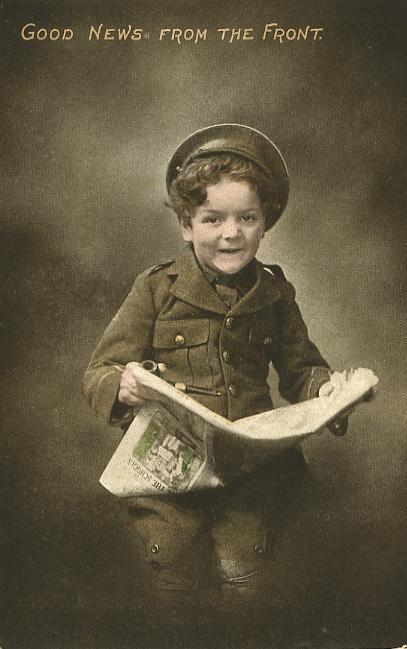
World War I: Wars News and Censorship--England

Figure 1.--News from the critical Western Freont was almost immediately availavle to British newspapers which is how news was desimated to nthe public. Wireless existed, but tere were not yet commercial broacasts. The informatiion released to the public was heavily censored. This is a British rotogravure printed photo postcard featuring a boy dressed up like a soldier holding a newspaper.
|
|
Britain has a long tradition of press freedom. I am not sure how war news was reported before World War. The length of the War had an affect on reporting. The improventments in communication meant that material printed in the press could be used by the emnemy. This included both information on military units and movement as well as reports on the economy and other non-military developments. Press reports could also affect civilian morale ans support for the war effort. As a result, all the combatant nations, including countries with long histories of a free press instituted varios systems of cennsorship. The British Parliament almost immidately after the War began passed the Defense of the Realm Act (August 8, 1914). The law was prepared by the Committee of Imperial Defense. There would be six revisions of the Act during the course of the War. The Act cave the Government broad legal power to act and to dispense with basic civil liberties in specific circumstances. Individuals suspected of espionage could be arrested and held without trial. The Government was also given authority to control the flow of information. This included mail and telegraphs. War information from the Western Front was almost immefiately available in Britain as a result of telegraph reports. The Government also was given the authority to supress criticism of its policies, including war strategy and tactics. Journaliss could be arrested for publishing information that could be used by the enemy. This could be interpreted in a variety of ways and as the War progressed, the interpretation was broadened. One very dufficult was reporting casualties and from the onset of the War, the casualties were greater than had ever been experienced by British armies. The Government was very sensitive about this because Britain began the War with a volunteer army and reports on the dredful casulaties could affect recruitment as well as public opinion more broadly. There were complaints about Government censorship of war news. Some changes were made. Additional journalists were allowed to report (January 1915). But the Government continued to censor war news.
CIH -- WW I

Navigate the CIH World War I Section:
[Return to the Main English home front page]
[About Us]
[Aftermath]
[Alliances]
[Animals]
[Armistace]
[Biographies]
[Causes]
[Campaigns]
[Casualties]
[Children]
[Countries]
[Declaration of war]
[Deciding factors]
-------[Diplomacy]
[Economics]
-------[Geo-political crisis]
[Home front]
[Intelligence]
[Military forces]
[Neutrality]
[Pacifism]
[People]
[Peace treaties]
[Propaganda]
[POWs]
[Russian Revolution]
[Terrorism]
[Trench warfare]
------[Technology]
[Weaponry]
[Bibliographies]
[Contributions]
[FAQs]
[Images]
[Links]
[Registration]
[Tools]
[Return to Main World War I page]
[Return to Main war essay page]
[Return to CIH Home page]
Navigate the Historic Boys' Clothing Web chronological pages:
[The 1840s]
[The 1900s]
[The 1930s]
[The 1940s]
[The 1950s]
[The 1960s]
[The 1970s]
[The 1980s]
[The 1990s]
Created: 3:44 AM 10/18/2009
Last updated: 3:44 AM 10/18/2009



